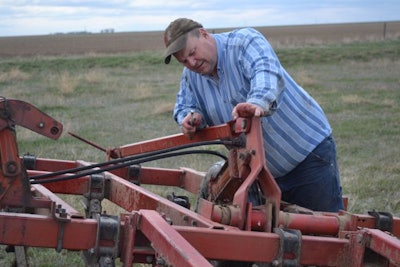
If I could take any U.S. senator with me on a fishing trip, it would probably be Sen. Jon Tester.
I’ve never met the man, but he easily ranks high among my favorite politicians. However, that has nothing to do with to which political party he belongs.
If you go to his Twitter page, you will see an old Minneapolis-Moline tractor, among other dated farm equipment, on his cover photo. Being a Minneapolis-Moline man myself, this is something I appreciated. A third-generation Montana farmer, Tester, unlike many of his colleagues in Congress, actually knows what it’s like to do manual labor and get his hands dirty. In fact, he’s missing three fingers as a result of an agricultural-related accident.
He's got a flat-top haircut, is a former music teacher and once used the phrase "get $#!+ done" in an interview with Politico. He seems like the type of guy we need more of in Washington. I just like his style.
But let’s get on to why I’m writing about Tester today. In this case, it actually has something to do with politics.
Tester’s letter
Tester recently caught my attention as he wrote to Secretary of Agriculture Tom Vilsack, Homeland Security Secretary Alejandro Mayorkas and Attorney General Merrick Garland, asking them to thoroughly investigate the recent cybersecurity attack on JBS.
What exactly he said in the letter may not be appreciated by some of our readers, and I’m not even 100% sure what to think of it myself, but it is still worth considering.
“JBS currently processes more than 20 percent of cattle, more than 15 percent of the pork, and a significant portion of the poultry in the United States. It is unacceptable for a foreign adversary to disrupt such a significant portion of our food supply with one attack. That’s why I urge (the Department of Justice, Department of Homeland Security and U.S. Department of Agriculture) to swiftly investigate this attack and develop recommendations to prevent a similar attack from happening again,” Tester wrote.
“In recent weeks, it is increasingly evident our adversaries understand the damage they can inflict by targeting our critical infrastructure. While any attack on critical infrastructure can lead to substantial damages, attacks on our food supply are particularly alarming. As a farmer, I know first-hand both the importance of feeding America and the complexity of our food supply chains. Through my own experiences and from conversations with countless producers, it is clear that our food systems are far too vulnerable. Last year, the pandemic highlighted how consolidation is wreaking havoc on markets and now this attack on JBS shows that our enemies can take full advantage of this situation.
“I urge your agencies to work together to get to the bottom of this incident. American producers and consumers are already hurting from the economic turmoil of this past year. In order to prevent future attacks, we must identify and fortify our critical infrastructure.”
Thoughts on industry consolidation
I didn’t address it before, but Tester is a Democrat. That is probably not surprising, since Democrats have tended to be more in favor of limiting industry consolidation or breaking up big businesses than the other party has been.
But in a press release in which Tester announces his letter to the cabinet members, he points out that only four companies operate 18 of the 20 largest beef plants in the United States.
He doesn’t mention those four by name, but they are JBS, Tyson Foods, Cargill and National Beef.
It’s worth noting that JBS, Tyson and Cargill all have a strong presence in the U.S. poultry industry, whether it be broilers or turkeys. Even National Beef has connections to the global poultry industry, as the majority stakeholder in that company is Marfrig Global Foods, which also holds a 31.66% stake in BRF.
And even after the cyberattack, JBS seems to be getting larger. The company this week announced its intent to purchase Rivalea Holdings and Oxdale Dairy Enterprise, both based in Australia.
It does make sense that if an industry is too consolidated, it would likely be more vulnerable in the case of a future cyberattack.
And those in food production must ask themselves if being too large will hinder them in their ultimate goal of making sure that people are fed. I don’t have all the answers, but I do hope that the recipients of Tester’s letter are at least asking questions.
















